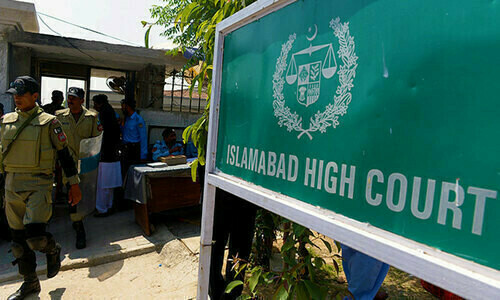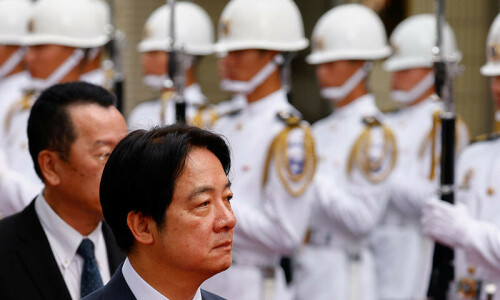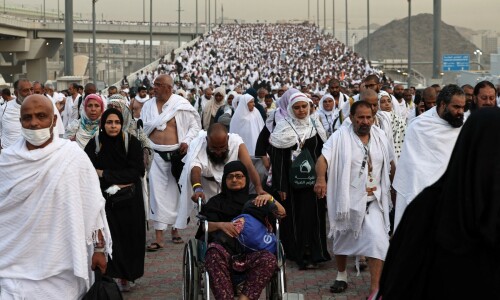LAHORE, June 27: A high-level inter-provincial meeting which met here on Sunday recommended that the local government elections should be held on party basis and district nazims be elected directly.
It recommended internal recall of district nazims and powers to local government commissions (LGCs) to initiate penal action against them, approval of district governments budget and their audit by the provincial assemblies, separate election of nazims and naib nazims and permission to nazims to conduct house in the absence of or refusal by their deputies.
The meeting was presided over by Punjab Law Minister Raja Basharat and attended by Chief Secretary Kamran Rasool, NWFP Chief Secretary Ejaz Ahmad Qureshi, Sindh Chief Secretary Aslam Khan Sanjrani, all provincial local government secretaries and Punjab Finance Secretary Salman Siddique.
The officials met in pursuance of a decision by a meeting presided over by President Pervez Musharraf and attended by all chief ministers, deciding to unanimously suggest amendments to the Local Government Ordinance 2001 so as to make the district governments more effective.
The law is likely to be amended in the light of the joint proposals by the provinces by December this year. Another inter-provincial meeting will be held to make a final draft of the proposed amendments in Islamabad on July 1.
During the meeting, officials from other provinces presented their views on the law and discussed in detail the model draft proposed by Punjab.
According to official sources, the meeting discussed issues confronting the local government system which included absence of a mechanism to enforce local and special laws by the district governments, and of an effective system to ensure accountability and transparency of the use of funds by the local governments.
Another major issue was the provincial government's lack of powers to control and supervise the local governments, especially the tehsil and union councils.
It was pointed out at the meeting that the provincial governments were not empowered to give directions to the local governments, to suspend or quash resolutions and actions taken by them against public interest and that the procedure for the external call of nazims was cumbersome.
Sources said the meeting agreed that the provincial governments should be empowered, through the LGCs to take cognizance of the district nazims' misconduct or mal-administration prejudicial to public interest. The powers could be in the shape of initiation of penal action.
Officials said the meeting agreed to eliminate the present system of external recall of nazims. For an external check the misconduct by nazims should be described and the LGCs be allowed to initiate penal action against the guilty. The action could include cases under anti-corruption laws, making nazims liable to lose offices if proved guilty.
The meeting agreed that the provincial legislature must have a check on how the funds given to the local governments by the provincial governments were used. The district governments should themselves appropriate funds but these must be scrutinized by the provincial assembly.
At present, the districts governments make budgets and shift funds of one project to another without the knowledge of the provincial governments and there was no method for the latter to check such affairs.
A proposal that came up was that the provincial governments should give resource position to the districts governments by the end of March and they, in turn, must approve their budgets by the end of April. Following this the budgets should be sent to the provincial assembly which would approve them along with their own budgets in June.
The plea behind this proposal was that the provincial assemblies could only conduct audit of district governments if they had any information of the allocations made by them under different heads. This would also eliminate the unilateral practice of shifting funds to other schemes.
It was agreed that the provincial assemblies should conduct audit of district governments funds through their public accounts committees. If this was not possible then the old policy of having separate provincial and local government funds should be revived for audit of the district governments by local councils.
Currently, the district governments are getting funds from the provincial governments through single line transfers.
The meeting proposed to disallow the district governments to collect various taxes like education and health. Instead, they should be allowed to collect service charges on related facilities.
The sources said the meeting discussed collection of taxes by the district governments.
As Sindh and the NWFP representatives said that unlike Punjab they had not devolved their excise and taxation departments, it was decided to make a uniform policy in this regard.
The LGCs should also be empowered to quash proceedings of a local council meeting or set aside any action prejudicial to public interest, the meeting proposed.













































Dear visitor, the comments section is undergoing an overhaul and will return soon.